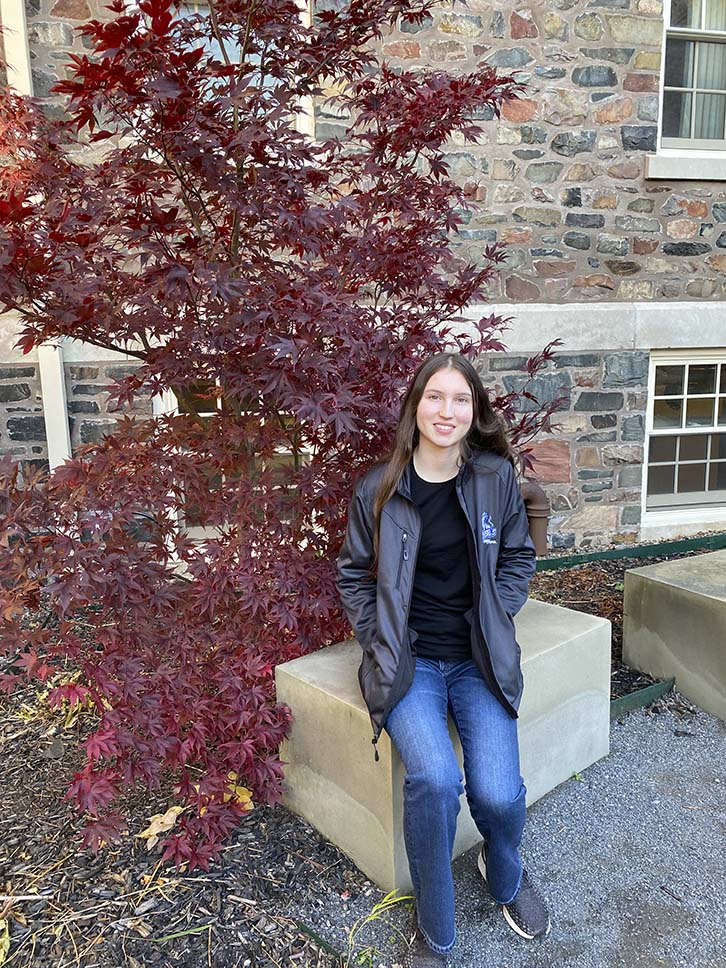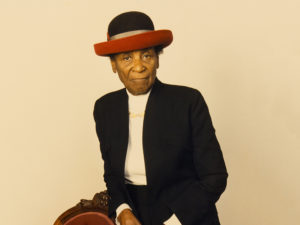
Catherine St-Jean is the 2021 recipient of the Dr. Carrie Best Scholarship.
Catherine St-Jean of Sudbury, Ont., knew she wanted to attend university in Eastern Canada. Her mother is from Millbrook First Nation in Nova Scotia, and St-Jean liked the idea of living closer to family. She decided to apply to King’s when she realized that the university, located less than an hour from her mother’s hometown, offered a first-year program that would enhance her writing and communications skills. Today as St-Jean nears the end of her first semester in the Foundation Year Program (FYP), she also holds the distinction of being the 2021 Dr. Carrie Best Scholar.
Dr. Carrie Best (DCL’92), was an African Nova Scotian writer, publisher and broadcaster from New Glasgow, N.S., who is remembered as a fearless advocate for human rights and equity. Dr. Best received the Order of Canada in 1974 and was posthumously awarded the Order of Nova Scotia in 2002. The Dr. Carrie Best Scholarship is a renewable entrance award for Black and Indigenous Canadians who demonstrate academic excellence. It is valued at up to $20,000.
It’s not hard to see why St-Jean is a fitting recipient of this award. In her senior year at Marymount Academy in Sudbury, she was the secretary for the school’s inaugural diversity and antiracism council. The council, she explains, was created “to have more representation in the school and advocate for different groups of students.”
Since coming to Halifax, St-Jean also participated in an Indigenous Youth Hackathon hosted by the Canadian Roots Exchange (CRE). That involved developing and presenting a policy brief on distinctions-based health legislation as part of a small team of Indigenous youth.
St-Jean says receiving an award in Dr. Best’s name is “an honour” and it’s one she takes seriously.

Dr. Carrie Best, DCL’92
“From what I know of Best’s legacy, she strikes me as an incredible educator through her advocacy. She seemed very dedicated to listening to people’s experiences and giving people a platform to share those, as well as using her own voice. I hope throughout my time at King’s I can follow her example to listen and learn from the people around me, as well as share my own limited experiences and advocate where I can for Indigenous, among other, communities.
One of King’s major scholarships, the Dr. Carrie Best Scholarship is awarded, in part, on the basis of the student’s scholarship application essay, written in response to a prompt. St-Jean says her essay discussed the way interpretations of the truth can differ from fact and conversely, how facts and interpretations can also work together.
When the call came in to tell her she’d been named the 2021 Dr. Carrie Best Scholar, St-Jean was out of the house, working as a dog-walker for her neighbours. Returning the call when she got home, she recalls feeling excited, but unsure of how to respond in the moment. “I was pretty excited,” she says. “I was a bit nervous, in that I wasn’t sure. I was like ‘oh, this is exciting but how excited should I sound over the phone?'”
A few months into FYP, she says that one thing that has surprised her is the opportunity for student-led discussions in tutorials. “The tutors will often help you explore some of the themes that were brought up in the lecture, which is interesting because you get to look at the themes that interest you and also hear about the things that stood out to people who have studied the text for a long time. I’m really enjoying that and I’m also pleasantly surprised that there’s a lot of student-led discussion.”
Asked what she would say to someone considering applying for a scholarship at King’s, St-Jean says “I’d say just go for it. I wasn’t too sure if I should apply for a scholarship and I did put it off until rather last minute but take a chance with it, you never know.”

